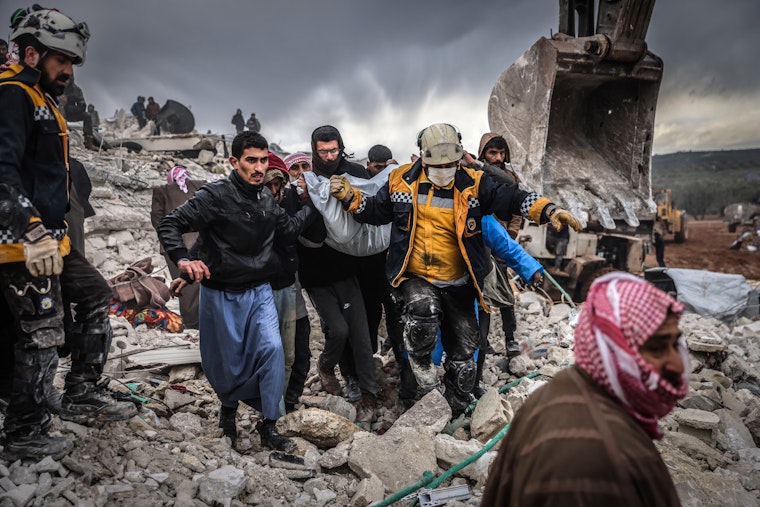Syria’s Earthquake Horrors Have Underlined the Urgent Need for Sanctions Reform
By Julia Sakr-Tierney

“What we are witnessing today is death on top of death” is how the deputy head of the White Helmets civil defense group described the earthquakes that killed 45,000 and counting in Turkey and Syria. After over a decade of bombardment by the Syrian government and Russian warplanes, the White Helmets were digging out victims in opposition-held Syria with their bare hands and without any international support. The only United Nations–authorized border crossing into Syria from Turkey was closed for four days, and only after a week did the UN reach an agreement with Damascus to open two more crossing points. Now as the focus shifts from rescue to recovery, we can expect to see more questions raised about the impact of sanctions on those efforts.
Syria has been sanctioned by the U.S. since 1979, but in response to the crackdown on protestors in 2011, comprehensive sanctions were imposed banning all assistance to the government and almost all trade (aside from food and medicine). This is in addition to targeted sanctions designating regime members and its businesses partners. In 2019, Congress passed the unprecedented Caesar sanctions— named after the defector who exposed systematic murder and torture in Syrian prisons—on the construction and energy sectors and secondary sanctions on foreign entities providing material support to the regime.
Apologists for Bashar al-Assad’s government advocate for the lifting of all sanctions, while many seeking accountability against his regime argue that sanctions have always exempted humanitarian aid.
Sanctions are not intended to bar humanitarian aid; they often do so in practice.
The UN channels extensive assistance into Syria, much of it embezzled and weaponized by the regime, but comprehensive sanctions have chilling effects on humanitarians and civil society. The sanctions on Syria are multilayered and opaque; navigating exemptions and obtaining waivers is time-consuming, with inquiries to the United States Office of Foreign Assets Control (OFAC) unanswered and denials issued with no explanation. Compliance is expensive when aid efforts often involve indirect interactions with the Syrian state and its hundreds of designated entities and individuals. Another obstacle is the broad interpretation of sanctions by banks, even those based outside the U.S., which are wary of falling afoul of OFAC and unwilling to process transactions related to Syria. Sanctions also block support to civil society outside Syria when the mere mention of the country raises red flags.
Fault for the misery facing Syrians primarily lies with the government, but comprehensive sanctions have exacerbated their suffering. They have contributed to shortages of cooking gas and electricity, blocked imports so factory owners cannot rebuild their destroyed facilities, and impeded reconstruction. In the words of the political economist Karam Shaar, “sanctions have had little to no effect in pushing the regime to offer political concessions, engage meaningfully in a peaceful settlement of the conflict, or improve its human rights record.”
Sanctions are increasingly coming under criticism, even by their advocates. George Lopez, one of the architects of targeted sanctions, calls for an end to “senseless, endless sanctions,” noting that when they have not achieved their aims after two years sanctions rarely succeed, yet are not revised or removed. Daniel Drezner, a political scientist, writes “the evidence . . . is unambiguous: financial sanctions contribute to increased state repression, worsening human rights standards, higher levels of corruption and lower levels of economic development.” They are among the chorus of critics pointing both to the costs borne by civilians and to the fact that sanctions rarely succeed at regime change. Rather the opposite: Repressive regimes exploit sanctions to ensure they exercise greater control over the economy.
Sanctions reform is essential to alleviate their humanitarian harm. Days after the earthquakes, OFAC issued a six-month suspension of sanctions related to relief and recovery. This follows OFAC’s recent decision to issue general licenses to expedite aid in complex humanitarian contexts and UN2664 that provides humanitarian carve-outs for UN sanctions. Broader reforms are required, including:
- Periodic reviews of sanctions’ impacts and effectiveness in furthering foreign policy objectives
- Writing in sunset clauses so that sanctions no longer fulfilling their purpose can be removed
- Establishing credible commitments to lifting sanctions when agreements are reached
- Ensuring more transparency from OFAC and better coordination with civil society
- Allowing remittance transfers
- Aligning sanctions with diplomacy, or else economic statecraft alone is unlikely to be effective
The most important step would be for OFAC to provide additional assurances to banks to ensure they process humanitarian and other permitted transactions for Syria.
Comprehensive sanctions are blunt instruments. In Syria, they have wreaked extensive, if unintended, damage, isolating not only the government but also civilians and civil society caught in the crosshairs of overly-conservative interpretations. In the aftermath of the earthquakes, which have wrought devastation on top of a devastating decade of war, there should not be a temporary fix but a comprehensive reform of sanctions so that they no longer punish the wrong people.
Julia Sakr-Tierney is a senior policy officer with Open Society–Middle East and North Africa.


